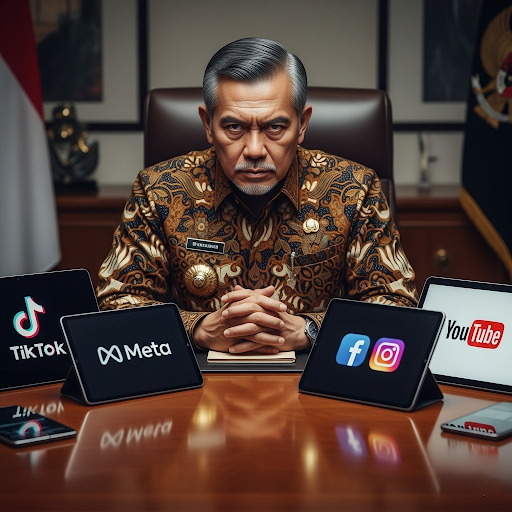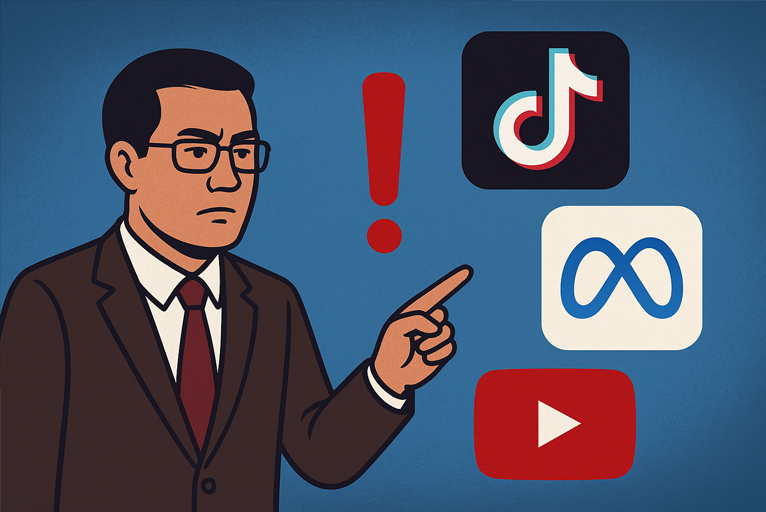Premium Biz Post – In a decisive move signaling a tougher stance on digital platforms, the Indonesian government has announced plans to impose stricter regulations and potential sanctions on major social media companies, including TikTok, Meta, and YouTube. The measure, dubbed “Government to Sanction TikTok, Meta, YouTube,” comes as part of a broader strategy to combat harmful online content, misinformation, and other digital threats that have raised security concerns in the country.

Indonesia’s Digital Landscape Under Pressure
Indonesia is one of the world’s largest markets for social media platforms, boasting over 200 million internet users and a rapidly expanding digital economy. Platforms like TikTok, Instagram, and YouTube are integral to the daily lives of Indonesians, serving as key outlets for entertainment, communication, and commerce. However, with this growth has come a wave of challenges.
In recent months, Indonesian authorities have expressed alarm over the surge of harmful content, including hate speech, fake news, and illegal online gambling advertisements. These issues have been particularly concerning amid ongoing political unrest, where viral misinformation has amplified tensions in major cities such as Jakarta and Denpasar.
The government’s plan is part of a broader push to ensure accountability among tech giants operating in the country. Officials argue that platforms must take more responsibility for moderating their ecosystems, rather than relying solely on user reports or waiting for government takedown requests.
Key Highlights of the New Regulations
The Indonesian Ministry of Communication and Information Technology (Kominfo) has outlined a series of proposed regulations aimed at addressing the digital content crisis. These include:
- Mandatory Content Moderation Systems
Platforms will be required to strengthen AI-driven moderation systems and proactively remove content flagged as harmful or illegal. - Local Data Center Requirements
Companies must ensure that data from Indonesian users is stored locally to safeguard national security and consumer privacy. - Transparent Algorithms
Social media companies will need to disclose details of their recommendation algorithms, ensuring they do not promote misleading or harmful content. - Fines and Platform Suspension
Repeated violations could lead to hefty fines and, in severe cases, temporary suspension of platform operations within Indonesia.
These measures reflect a growing global trend of governments holding tech companies accountable for their role in shaping public discourse.
Read More : ”Used Cans A Sustainable and Aesthetic Solution”
Impact on Social Media Platforms
The announcement has placed TikTok, Meta, and YouTube in the spotlight. While these platforms have long touted their investments in AI moderation, the Indonesian government argues that their current systems are insufficient to curb the spread of disinformation and harmful content.
TikTok, owned by ByteDance, has already taken precautionary measures by temporarily disabling its LIVE feature in Indonesia, citing safety concerns. Meta, the parent company of Facebook and Instagram, has expressed a willingness to work closely with local regulators to enhance content oversight. YouTube has also pledged to review its moderation processes and increase collaboration with Indonesian authorities.
Industry analysts suggest that these platforms may face significant operational and financial challenges if the regulations are fully enforced. The requirement to store data locally, for example, would necessitate building or leasing additional data centers in Indonesia—an expensive and time-consuming endeavor.
Balancing Freedom of Speech and Security
The crackdown has sparked debate over digital rights and the balance between free speech and online safety. Critics argue that broad government powers to sanction platforms could lead to overreach, stifling free expression and creativity on social media.
However, supporters emphasize the urgent need for stronger regulations, citing the devastating effects of unchecked misinformation. During recent unrest, viral videos and false reports spread rapidly, inflaming tensions and fueling public fear. The government argues that without stricter oversight, such incidents will continue to destabilize society.
Digital rights experts say that transparency will be key. Clear guidelines on what constitutes harmful content, coupled with open communication between regulators and tech companies, could help strike a balance between safety and freedom.
A Global Trend in Tech Regulation
Indonesia is not alone in its push for greater accountability among social media companies. Countries like India, Australia, and members of the European Union have introduced similar laws aimed at combating disinformation, hate speech, and other harmful content.
For example, the EU’s Digital Services Act (DSA) mandates that large platforms disclose their moderation efforts and take swift action against illegal content. India has also tightened its IT rules, requiring tech giants to appoint local compliance officers and respond quickly to content takedown requests.
By joining this global movement, Indonesia is positioning itself as a key player in shaping the future of digital governance in Southeast Asia. Experts believe that other nations in the region may follow suit, leading to a more regulated digital environment across the Asia-Pacific.
Economic Implications for Indonesia
While the regulations aim to address pressing safety concerns, they also have significant economic implications. Indonesia’s digital economy is one of the fastest-growing in the world, projected to reach USD 130 billion by 2025. Social media platforms play a vital role in this growth, providing small businesses and content creators with opportunities to reach millions of consumers.
Stricter regulations may create friction in this ecosystem. Small businesses that rely heavily on social media advertising could be affected if platforms face disruptions. However, analysts argue that the long-term benefits of a safer digital space—such as increased consumer trust and reduced fraud—will outweigh short-term challenges.
The government has stressed that its goal is not to stifle innovation but to ensure that Indonesia’s digital transformation is built on a foundation of security and accountability.
The Role of Artificial Intelligence in Moderation
Artificial intelligence will be at the heart of this regulatory shift. By mandating AI-driven moderation systems, Indonesia hopes to reduce human error and speed up the identification of harmful content.
Companies like Tanla Platforms have already partnered with local telecom providers to deploy AI solutions for detecting spam and fraudulent messages. These initiatives signal a broader shift toward automation and smarter content filtering.
However, AI moderation comes with its own challenges, including algorithmic bias and the risk of over-censorship. Experts warn that governments and tech companies must work together to create systems that are both accurate and transparent.
Public Response and Industry Reactions
Public opinion on the crackdown has been mixed. Many Indonesians welcome the move, citing frustration over the proliferation of scams and harmful content on their favorite platforms. Parents, in particular, have expressed concern over the impact of inappropriate content on children and teenagers.
Industry players, however, are urging the government to consult with stakeholders before finalizing the regulations. Tech companies argue that implementing these changes will require significant investment and time, and a rushed rollout could lead to unintended consequences.
Local startups are also closely watching the situation, as stricter regulations could create opportunities for homegrown platforms to compete with global giants.
Looking Ahead: What’s Next for TikTok, Meta, and YouTube?
As the government prepares to enforce its new rules, all eyes are on how TikTok, Meta, and YouTube will respond. The companies are expected to submit compliance reports in the coming months, outlining their plans to meet Indonesia’s standards.
For TikTok, the temporary suspension of its LIVE feature may be just the beginning of deeper changes in its operations. Meta will likely focus on strengthening its AI moderation capabilities, while YouTube may explore partnerships with local fact-checking organizations to curb misinformation.
Ultimately, the success of this initiative will depend on collaboration. If tech companies, regulators, and civil society groups can work together, Indonesia could set a precedent for balancing innovation with accountability in the digital age.
The Indonesian government’s decision to sanction TikTok, Meta, and YouTube marks a turning point in the country’s digital journey. With over 200 million internet users, Indonesia’s online ecosystem is vibrant but increasingly vulnerable to harmful content and disinformation. The government’s bold move, encapsulated in the phrase “Government to Sanction TikTok, Meta, YouTube,” reflects a growing global consensus: tech giants must take greater responsibility for the platforms they operate.
While the road ahead is complex, this initiative could pave the way for a safer, more transparent digital future—not just for Indonesia, but for the entire region.



